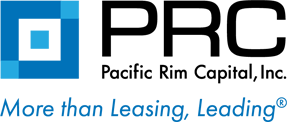Not sure where to start? Let us help you.
When you are looking at options to finance equipment, the number of choices can be overwhelming. There are many options to finance equipment and each option has its set of benefits and disadvantages. It’s important to identify the right option for your business. Let us break it down for you.
There are four different types of equipment finance:
- An independent lessor
- A bank
- Financing arm of Original Equipment Manufacturer (“OEM”)
- A broker
As with any decision, you should perform thorough research to see which option will work best for you.
However, we recommend looking past low lease rates or monthly payments and learn which option will truly give you the lowest total cost of ownership over the economic useful life of your leased asset.
Which Option Is Best for Me?
Independent Lessor
Value Proposition: Independent lessors, such as Pacific Rim Capital, Inc., have a vested interest in every transaction and a commitment to customer service. PRC’s consultative approach will help you manage your cash and your business processes. The independent lessor will be the single point of contact and play a large role in the management of your asset and lease from beginning to end.
A lessor like Pacific Rim Capital, Inc, will be able to provide asset management expertise that will allow you to receive the highest ROI from your asset while maintaining the lowest total cost of ownership. An independent lessor will be a strategic partner, helping you evaluate your lease options to align with your company’s best interests.
Bank
Value Proposition: Options for lower rates with a large amount of access to funds for financing and experience handling large or complex transactions.
Financing your asset through a bank, whether directly or through a broker, is another option for your MHE lease. When you choose a bank, you will have the option for different types of leases as well as the option for a loan. A bank will also have direct access to a large amount of funds for financing and have the experience to handle large and complex transactions.
However, when you work with a bank you typically do not have a dedicated point of contact or account manager. Because of this, the banks win. They are not aligned to your interests and are focused solely on maximizing the ROI of their investment. A Lessee could end up paying more money in the long run even though rates may appear attractive up front.
OEM
Value Proposition: Access to the newest and latest equipment directly from the manufacturer with expert knowledge about that specific brand.
When you work with the actual equipment vendor to finance your lease, their objective is to flood the market with new units. They want the old units back as quickly as possible so they can utilize them as part of their rental fleet.
Because of this, their interests are not tied to the lessee’s. Although the OEM will help you with returning the equipment at the end of the lease, it is because it is beneficial for them to have the asset back. Because of this, you won’t be accidentally pushed into a month to month or extended lease contract.
However, since it is beneficial for the OEM to receive their asset back, they might encourage you to enter into a new, more expensive lease with the “latest and greatest” product which might not always be in your best interest.
Selecting an OEM also limits your options. Choosing to lease from an OEM will restrict a lessee to choosing only the products that the OEM carries. An independent lessor will allow you to select any asset from any manufacturer. If a lessee only leases through an OEM, they will not only need to manage multiple leases with varying terms but also multiple companies with different cultures and points of contact.
Managing multiple leases with different OEMs can get quite confusing and time-consuming when it comes to all the administrative work associated with each lease. Each vendor may also require a large down payment for the assets, so you could lose out on any cost saving you may receive with monthly payments or rates.
Broker
Value Proposition: Access to a large list of banks which can help you gain competitive low rates on a lease. A broker works on commission to find the best bank to finance your loan (broker vs principal). They have access to a large list of banks and will be able to search for competitive rates and low monthly payments by comparing all your options for you.
However, brokers typically sell each transaction directly to a bank and have no interest or involvement after the initial agreement is signed. Once the deal is done, you will be working directly with whatever bank your broker found to finance the lease.
Once you are working with the bank, you will notice the same pros and cons as mentioned above. At this point, you are typically on your own when it comes to asset and lease management and you will not have one point of contact to reach out to in case of any issues.
Conclusion
While there are many different factors that come into play when searching for a financier for your MHE lease, remember to look beyond the lowest price. Instead, review each option to see which will align with your company’s best interests.
Companies who focus on low rates are typically focused on the short-term. However, the high administrative cost and internal resources needed to manage and track the assets offset initial savings over the course of the lease term.
Choosing an independent lessor, such as PRC, requires less internal resources and allows companies to focus on their core business and provides the lowest total cost of ownership.
Build the perfect partnership.
PRC is a minority-controlled business with global expertise, award-winning customer experience, and socially responsible corporation.

